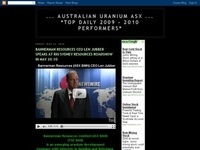Published on Saturday December 04 2010

Powertech Uranium Corp. applied in late November to the U.S. Environmental Protection Agency to inject radioactive waste into an aquifer beneath the proposed Centennial Project uranium mine site northeast of Fort Collins.
On Friday, the EPA approved a different permit for Powertech, a "Class V" permit to re-inject 43,000 gallons of water into Fox Hills Aquifer underneath the Centennial Project as part of a "pump test" that will help the company gather data about its uranium mining technique.
The pump test approval needed to occur before the EPA can go forth with investigating Powertech's plans to inject radioactive waste into the ground. Though Powertech has a green light from the EPA to drill the pump test well, state mining officials must also approve the test before it begins.
Powertech proposes to use a process called in situ leaching to mine the uranium. The process would pump a baking soda-like solution called a lixiviant into the ground to dissolve the uranium. The dissolved ore would then be pumped to the surface for processing.
No uranium would be removed during the pump test, which is a preliminary stage in determining the feasibility of mining at the Centennial Project site.
"One of the purposes of the pump test is to collect information about the hydrogeology at the (Centennial Project) location to inform the feasibility of ore recovery activities," said EPA spokesman Richard Mylott. "During the pump test, water will be pumped out of the aquifer, held for a time and reinjected into the same location in the aquifer. It will not be altered."

The application was approved following a yearlong environmental review and public comment process, which drew more than 100 people to a public meeting in Nunn late last year.
That was the first in what is likely to be three major federal public processes that have to occur before mining at the Centennial site begins.
In late November, Powertech submitted an application to the EPA for a permit to drill a "Class I" well, into which Powertech plans to dispose of its uranium mining waste.
"It would be radioactive fluid after they extract the yellowcake from the lixiviant," said Valois Shea of the EPA's Underground Injection Control Program.
In a Nov. 23 letter to residents living around the proposed mine site, Centennial project manager Terence Walsh said Powertech plans to inject "waste streams from an in situ leach uranium mining project" into the ground via six wells at a rate of 300 gallons per minute.
Walsh said Friday the letter was sent to 77 property owners within one quarter mile of the permitting area.
But the approval process for that well can't begin until Powertech applies for yet another well permit, this time for a "Class III" well. Should it be approved, the third permit would provide the EPA's blessing on the well needed to do the mining - the well through which the uranium dissolving solution would be pumped, Mylott said.
"It's up to Powertech as to if and when they'll apply for a Class III permit," he said.
Meanwhile, Colorado mining officials are crying foul over Powertech's lawsuit against the state regarding rules that place tight restrictions on in situ leach uranium mining in the state. The state adopted the new regulations in August following a lengthy rulemaking process.
In a Nov. 22 Denver District Court filing, the state claims Powertech failed to comply with the law when it neglected to serve its lawsuit on Attorney General John Suthers and failed to notify the "many hundreds of people who participated in this rulemaking proceeding."
On Nov. 1, Powertech sued Colorado Department of Natural Resources Director Mike King and members of the Colorado Mined Land Reclamation Board, which approved the rules, because the company believes the rules are unreasonable and hold Powertech to a higher groundwater protection standard than other mining companies.
Powertech USA President Richard Clement said earlier this year that a provision in the rules requiring the company to establish baseline groundwater purity before they even start looking or uranium underground would be "fatal" to all future in situ mining operations statewide.
Visit my other site Australian Uranium Investing
 Australian Uranium News - Research
Australian Uranium News - Research

No comments:
Post a Comment